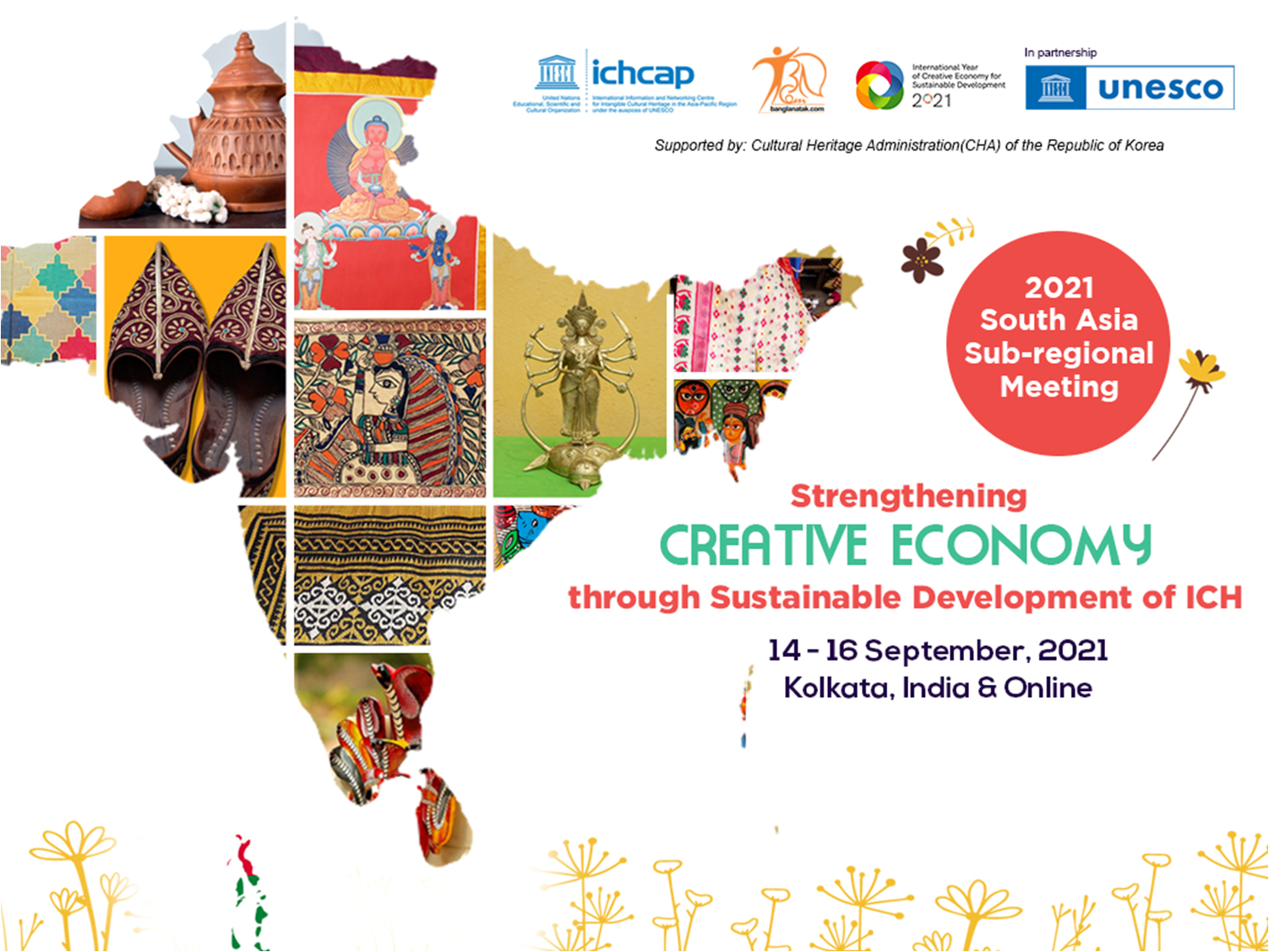Project Description
2021 South Asia Sub-regional Meeting for ICH Safeguarding in South Asia
Strengthening Creative Economy through Sustainable Development of ICH

Background
According to the 2003 Convention, Article 2.2 defines domains of intangible cultural heritage (ICH): oral traditions and expressions; performing arts; social practices, rituals, and festive events; knowledge and practices concerning nature and the universe; and traditional craftsmanship. For ICH bearers and communities, ICH skills are their identity and representation but also the way of living. The relationship between ICH and the economy has always been a question regarding sustainability: to what extent and how.
In light of the 2030 Sustainable Development Goals (SDGs) adoption at the 70th UN General Assembly, there have been cross sectoral efforts to better achieve the SDGs within the framework of the 2003 Convention. Highly emphasized five SDGs with the Convention are SDG 1(No Poverty), 4(Quality Education), 5(Gender Equality), 11(Sustainable Cities and Communities), and 17(Partnerships for the Goals). It does not mean that the other goals are not related to ICH, rather all are intertwined into these five goals, and they are more noticeable than others. As the branch of SDG11, the Meeting would like to focus on SDG1, No Poverty, in the sense of human security and SDG 8, Decent Work and Economic Growth. Particularly, the crafts sector is related to a diverse economic ripple effect. Therefore, ethical principles for safeguarding Intangible Cultural Heritage include both rights and duties for stakeholders on possible economic conflicts.
In tandem with diverse stakeholders, including the UNESCO office, government, and NGOs, ICHCAP has organized Sub-regional Meeting for ICH safeguarding in South Asia since 2015. In between, publication and online exhibition projects were delivered to raise awareness on ICH in leading ICH safeguarding discourses. Particularly, in 2019, under the title of “ICH and Education: Towards Joint Collaboration for Promoting in Formal and Non-Formal Education,” the ways of integration of value of ICH into education were discussed, and its outcome document reaffirmed the needs of interdisciplinary approaches and collaborations or joint projects by expanding networks.
The expansion of networks is not limited to the education sector. Recently, Banglanatak dot com hosted an online symposium and webinars regarding the HIPAMS (Heritage-sensitive Intellectual Property and Marketing Strategies) Project. Between ideal (safeguarding and transmitting the ICH) and reality (making a living), its focus lies on empowering the communities by identifying and creating adequate marketing strategies and remaining sensitive to heritage at the same time. Additionally, considering the current situation affected by COVID-19, places or products of practitioners suffer from economic difficulties. It is a definite threat to sustainability and the right time to touch on deeply.
Declared at the 74th United Nations General Assembly, the year 2021 is the International Year of Creative Economy for Sustainable Development. By highlighting the power of creativity for resilience and following the Operational Directives 109, “continuous recreation and transmission of knowledge and skills necessary for safeguarding intangible cultural heritage,” the Sub-regional Meeting for ICH Safeguarding in South Asia will focus on introducing and developing participatory approaches by reiterating the interdependence between the safeguarding of intangible cultural heritage and sustainable development with all stakeholders in this field. The organizers of the sub-regional meeting are: International Information and Networking Centre for Intangible Cultural Heritage in the Asia-Pacific Region under the auspices of UNESCO (ICHCAP), UNESCO New Delhi (Cluster Office for Bangladesh, Bhutan, India, Maldives, Nepal and Sri Lanka) and Banglanatak dot com, India.
OBJECTIVES
- Goal: To foster international collaboration and build a sustainable regional network of experts from government and civil society reflecting on the link between ICH safeguarding and economic promotion in pursuit of the 2030 SDGs in South Asia.
- Objective 1. To better understand the efforts and challenges of the intertwined relationship between ICH and the economy in South Asia and how that could be sustainable in a positive way;
- Objective 2. To discuss how we can draw the line between arts and commodification and can contribute to achieving SDGs, in particular, SDG 1 through SDG 11;
- Objective 3. To promote sustainable cooperation networks on regional and international level among various stakeholders in the field of ICH and the economic sector.
